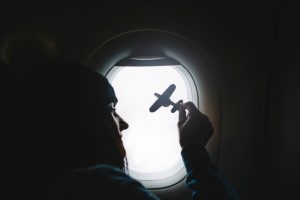Last November, roughly a month after the #MeToo movement spread virally across the globe, Silicon Valley executive Randi Zuckerberg was harassed on a plane. According to a post on Facebook, Zuckerberg said she felt “furious, disgusted, and degraded after an Alaska Airlines flight during which the passenger next to me made repeated lewd, inappropriate, and offensive sexual remarks to me.” The man sitting next to her in first class, Zuckerberg claimed, made degrading comments while drinking heavily and appraising the bodies of other women on the flight.
When Zuckerberg alerted a flight attendant, airline staff made excuses for the man's behavior. Zuckerberg was told not to "take it personally" and was offered the option of moving out of first class and into a coach-class middle seat. It wasn't until she posted a letter to Alaska Airlines executives on the website her brother founded (yes, she's that Randi Zuckerberg) that airline representatives said they would initiate an investigation and took away the rude passenger's travel privileges.
The incident, which happened to a high-profile business executive in the wake of a worldwide anti-sexual harassment movement, is proof that cultural shifts don't take place overnight; this is perhaps especially true when it comes to air travel.
Sexism and Sexual Harassment in Air Travel
There's a clear, demonstrable history of sexism within the airline industry. It was only a decade or two ago that female flight attendants, formerly known as stewardesses, were heavily sexualized and subjected to weight restrictions, no-marriage rules, and pervasive gender discrimination. Even at present, Vietjet, a low-cost Vietnamese Airline, plans to staff flights with attendants in bikinis. And fewer than 10 percent of airline pilots are women.
Meanwhile, female air passengers (and, likewise, female flight attendants) remain trapped in metal sky tubes filled to capacity with folks who may or may not have gotten the #MeToo memo. Worse yet, airline staff following outdated customer-service protocol may be inclined to err on the side of blameless mediation instead of truly hearing and accommodating the legitimate complaints of female passengers. Cultural power structures in the sky, like those on the ground, have yet to shift completely.
Zuckerberg's unfortunate case is a pretty strong example of sexual harassment. But more nuanced conflicts, such as those involving non-sexual invasions of personal space, may prove even harder to resolve.
When I was flying from Amsterdam to New York last year, a male passenger in the middle seat next to me poked me with his elbow dozens of times throughout the flight. His jabs woke me up again and again. I wasn't in his space. I wasn't even using the middle-seat armrest. Yet he continued to touch me unapologetically.
Did I experience sexism? The jury's out. I didn't have enough information about my seatmate to know if his rude behavior was gender-blind or the product of male entitlement to a woman's personal space. It's anyone's guess.
I shot him looks and even suggested he move to an empty aisle seat a few rows back (he declined), but I didn't notify a flight attendant. Thinking back on the incident, I should have made a fuss. I should have at least told the man to stop touching me. Who knows if this guy was even aware of the exasperation and discomfort he was causing me? Maybe he needed a wake-up call.
Randi Zuckerberg shared a similar reflection about her situation. "I am pretty furious at myself for not causing a scene in the moment," she wrote.
What to Do about Bad Behavior on Planes
Bad behavior on flights is a human issue, not just a gender issue, and calling for backup when faced with harassment or boorishness or lack of self-control may help improve flying for everyone, one passenger at a time. If you feel uncomfortable, say something. When a person enters your personal space on a flight, say something. When a person comments on your body on a flight, say something. Whether that means initiating a conversation with your seatmate or flagging a flight attendant is up to you.
Trust your gut. Your situation might necessitate only a conversation with a well-meaning but oblivious fellow passenger. Some people need a little help catching up with rapid cultural change. If your problem isn't resolved by polite discourse, talk to airline staff. If that doesn't work, write to airline executives. Tweet at them. Tag them. Don't let up. Air travel, like every facet of public space, needs to shift in alignment with the new fairer dynamics of the post #MeToo landscape.
But first, we might need to give it a little push.
Above image by Oscar Carrascosa Martinez via Shutterstock






